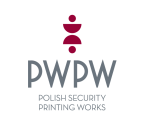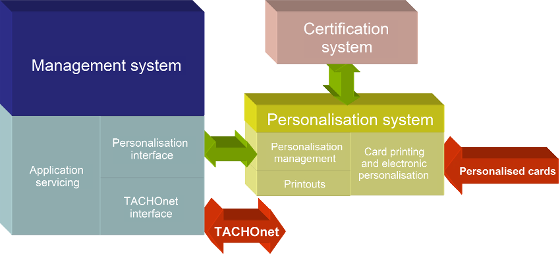Enrolment of personal and biometric data – ES area
Local offices/locations (ES) accept applications for the issuance of documents, enrol biometric data and issue finished documents as well as provide post-issuance services, i.e., services connected with lost or stolen documents
.
Wide area network - WAN
The wide area network (described in detail in the "PWPW WAN" section) is a safe platform for transfer of orders for highly secured products (eIDs/ePassports). It connects all ES locations in Poland with the Data Centre and personalisation centres.
Central System
Management subsystem is a central register of all applications that also provides information on their current status. The system supports production and distribution subsystems for finished documents. It is composed of:
- a module for registration of applications received from local offices (ES);
- a module for quality and biometric verification of applications; and
- service area for personalised documents, including their dispatch to local offices (ES).
Production subsystem is a module responsible for the entire personalisation process:
- receipt of applications for personalisation;
- graphic and electronic personalisation; and
- detailed log ensuring indisputability of information.
Biometric matching subsystem (AFIS) is a central register of biometric data and additional services. It is used for:
- recording data in the central database;
- identification;
- verification; and
- quality evaluation of biometric data.
Security subsystem is a set of mechanisms ensuring high level of security of the entire IT system that supports the servicing of biometric documents. These include:
- central user and authorisation management services;
- IT infrastructure: firewalls, DLP systems, IPS/IDS, AV;
- time synchronisation services for the needs of all systems and the transmitted logs;
- central log-in system; and
- Public Key Infrastructure (PKI).
PWPW has its own Public Key Infrastructure (PKI) required for the provision of electronic certification services, including, among others, the issuance of qualified certificates and time stamping. PWPW offers transactional systems based on its own technological products and integrates them with solutions already held by the client. PKI products are offered as a service or are implemented at the client's premises.
PWPW has extensive experience in designing, implementation and maintenance of production systems for identity cards, biometric passports, driving licences and other documents. PWPW has implemented among others:
- Passport Information System in Poland;
- biometric passport system for Lithuania;
- identity card system (eID) for the Republic of Armenia;
- biometric passport system (ePassport) for the Republic of Armenia; and
- passport system for Bangladesh.
PWPW has developed its own applets, i.e., PWPW
SmartApp®. These products are used in cards and electronic documents such as biometric passports, electronic identity cards, IDs and cryptographic cards. PWPW
SmartApp® solutions are composed of specialist software (the so-called applet) developed by PWPW software engineers, an operating system and a special microchip dedicated to applications that require high security level. The applied technology offers the highest level of security of the stored data and broad possibilities of use of PWPW
SmartApp® in electronic services and transactions. It also offers broader opportunities for users and control/inspection authorities.
Biometric data enrolled in ES system, transmitted via WAN and personalised together with other data as part of the Central System is serviced with the use of PWPW's own
AFIS system.
IT systems supporting eDocuments require safe management of keys and certificates to maximise the level of safety and minimise the risk of unauthorised use of the keys (including Inspection System – IS keys). PWPW has developed its own
Central Inspection System (CIS) for central provision of IS key services for the needs of local offices (ES).



















